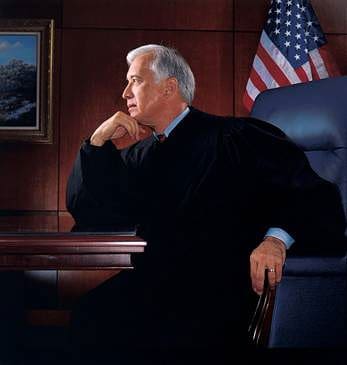“It appears that when the fledgling republic adopted the Second Amendment, an expectation of sensible gun safety regulation was woven into the tapestry of the guarantee.” – Judge Edward Prado, Fifth Circuit Court Houston quoted in Gun-Sales Restriction Is Upheld for People Under 21 [via wsj.com]





Maybe he should stick to textiles, as his understanding of law is lacking.
Haaaa! Can’t believe his patronizing tone. And just look at the way he’s posing! He’s soo full of himself!
First, he was probably posed by the photog for the purpose of an official photograph, and second, there were two other justices who joined him in this unanimous decision.
“an expectation of sensible gun safety regulation was woven into the tapestry of the guarantee”
Talk about making stuff up. Did they make any reference or qoute to any such “tapestry”?
Talk about activist judges making stuff up! Wow!
And, in the same article they say
“People 18 to 20 years old may possess and use handguns, receive them as gifts and buy them from private owners. But licensed firearm dealers are prohibited from selling handguns to people under 21,”
Oh yeah, makes perfect sense….or not!
So, 18 to 20
Can buy booze — No
Can go to war — Yes
Can get married – Yes
Can sign legal documents – Yes
Can go to Jail as an adult – Yes
Join the Police Academy in most states -Yes
Hold public office in some states -Yes (In some countries, you can even be president)
Can purchase a gun – No
Under Obamacare, your a child until 26
Makes zero sense to me!
Obamacare??? Last I heard, this law was passed in 1968. Obama was not president. Try Johnson, good ol Texas boy. Now, this was the US Federal Court of Appeals. We have three parts to our government. Judicial, the President, and the Congress.
Guess what??? Obama has nothing to do with the judicial. By the way, Judge Prado was appointed by George Bush Jr. Do your homework.
I think Pascal is commenting on the federal government’s conflicting defintions of “adult” … He’s not commenting on Obamacare–aside from how it adds yet another defintion of “adult”–or implying that Obama had anything to do with selecting this judge or passing the law.
FLAME DELETED
Under Obamacare, your parents health insurance provider MUST cover you until you’re 26 years old or get married (whichever comes first). Hence “Under Obamacare, you’re a child until 26”.
Was it woven into the tapestry, or is it a penumbra and emanation?
“Progressive” judges think that law is a form of mysticism.
So now a good republican judge is a “progressive’? How do you get there? And law is a form of mysticism–tht’s why your cliients paid you so much money back in the day, right?
I’d say that portrait says a lot about what the good judge thinks of himself.
Not really convinced by the ad hominem attacks on this judge. Maybe he’s legally correct – and not just him, the vote was 3-0 – or maybe not. But I suspect those attacking him may not have actually read his opinion. There is a tendancy among some – but not all – who leave their opinions in this space to see those who disagree with them as not worthy of having their own opinions. I live in a country where gun ownership is tightly regulated. I disagree with some of these regulations but I observe them. And I do not think it always helpful to impugn the motives of those who do not agree with me.
You may be right. I think you are far too trusting of those with authority.
You have my utmost sympathy JM; you live in tyranny and darkness; the right to keep and bear arms without needing permission from the state has been the definition of a free man versus slave for all of recorded history; to me; it still is; when a person in authority infringes my second amendment rights by that definition; they are a tyrant.
Judge Edward Prado is a tyrant; simple statement of fact. No impugning involved.
Well said. What is up with the reply. I intended this for Jonathan Miller. As for
ThomasR. Get a grip!! With your thinking, anyone, anytime, anywhere may purchase a firearm.
How about your friendly violent criminal, released felons, neighborhood crazy?? Good luck staying alive in your town.
LoL, that’s a good one JPD, that’s what they do right now, ever hear of the black market? I’ll it say it real slow, when guns are outlawed, only outlaws will have guns.
Maybe he’s legally correct? I quote, from the US Constitution:
A well regulated Militia, being necessary to the security of a free State, the right of the people to keep and bear Arms, shall not be infringed.
I do not see anything in there about “Unless Congress decides to arbitrarily re-define the age of legality” or “Unless Congress decides that the illusion of public safety is more important than these inalienable rights”. “Shall not be infringed” is not a difficult concept, these corrupt judges merely choose to ignore it.
See, you can disagree with your countries laws all you want, but they’re legal because you do not have such a law as the Second Amendment protecting your right to keep and bear arms. Over here, our Constitution – the highest law of the land – specifically says that our right to keep and bear arms shall not be infringed, yet they keep making laws to infringe upon that right.
That lovely portrait should be more truthful and depict his thumb up his ass.
Yes, an expectation of sensible gun safety regulation was woven into the tapestry of the guarantee; it is “shall not be infringed”.
We should be encouraging the maturity and reaffirming the adulthood of 18 to 21 year olds, not infantilizing them.
I enlisted when I was 17. Saw the fringes of my first war before I turned 18. Finished my hitch and was home before I was 21. I gues I wasn’t grownup enough to buy a handgun through a dealer. I got my first pistol, a Russian tokarev, in the time honored military tradition. I won it in a barracks poker game when I was 18.
Awesome
“It appears …” he says. Where does that appear? And what percentage of the founding fathers expressed such an expectation?
If this schmuck ever runs for any office that I can vote on he won’t get my support. I think the expectations of the Founders was that every able bodied man own and become proficient with his arms. Second-Amendment scholars have noted that the word “regulated” used in the 2A is better defined or understood now as “organized”. The civilian militias located in the states and supported locally were to be well-organized and not regulated by today’s terms by the Feds in the Washington DC.
I’m all for discovering new rights in the text that we didn’t know were there, but under no circumstances should we reduce a right that is stated explicitly.
Seems to me that the line has to be drawn somewhere – a ten year old should not be able to go to Wal-mart and buy a Glock. Its too simplistic to interpret the Second Amendment as having no implicit limits on who can possess firearms. But the line needs to be drawn in a prinicipled manner, and to me the date should coorespond with the date that a person’s parents have no authority over them. It seems to me that if you can join the Army and be given a fully automatic rifle and told to kill the enemy, then you have reached the point where the government has no legal interest in preventing you from owning a handgun.
“Its too simplistic to interpret the Second Amendment as having no implicit limits on who can possess firearms. But the line needs to be drawn in a prinicipled manner”
#1
Joe, I’m kinda with you, but there’s a difference between being eligible to join the military and actually joining. While I agree that anyone in the military or who served honorably should be allowed to own a handgun if they so choose, I’m not so sure about those who would prefer to grow a third eye in their anus rather than enlist. If 21 is supposed to be the age of enlightenment where gun ownship becomes a right, let there be an exception for current or past soldiers, airmen, sailors and marines who have not yet reached the magic number.
I am all for 18 and older. Legally, at this point you are no longer being controlled. You are your own person, and essentially on your own. I agree a 14 year old should not be able to go and buy a Glock. However, an 18 year old can join the military, get a tattoo, move out get a job, and act like an adult.
So this should be a hard line as it were.
The operative word is “appears”. The word “appears” strongly implies conjecture, subjective interpretation and imagination…all of which have nothing to do with what the Second Amendment actually says. So, as long as Federal Judges think it appropriate to decide what they think the Constitution “appears” to mean we are at the whim of whatever fantasies any one of them chooses to entertain. This is what happens with politicians and the anti-gun crowd, too. The Founders consistently and clearly stated in their personal writings outside the Declaration of Independence and the Constitution that free people have the right to be armed for personal and national defense with no restrictions or infringement. Their projection was from their personal convictions INTO the Constitution, NOT the other way, as this Judge and the other anti-Second Amendment persons keep claiming.
Insofar as the age requirement for gun ownership is concerned, it is crystal clear to me that 18 should be the national norm. No doubts or fantasies about it.
“Was it woven into the tapestry, or is it a penumbra and emanation?
“Progressive” judges think that law is a form of mysticism.”
I read the opinion myself, http://www.ca5.uscourts.gov/opinions/pub/11/11-10959-CV0.wpd.pdf and found nothing relying on “penumbra and emanation.”
What I found in 41 pages was a lot more than which was presented in a Wall Street Journal preview.
Actually, with two judges appointed by a Republican President (George Bush)seems they avoided judicial activitism as I have come to understand it.
But heck, IANL, what can I know?
“Judicial activism” is just the latest buzz word to state the obvious — that an individual disagrees with their conclusions. When you agree with their outcome, then you call it “upholding the law” or the Constitution. When you disagree with their conclusions, you call it “judicial activism”.
I haven’t read the opinion, but it is certainly possible to take this to the Supreme Court.
From the decision:
We have summarized considerable evidence that burdening the conduct at issue—the ability of 18-to-20-year-olds to purchase handguns from FFLs—is consistent with a longstanding, historical tradition, which suggests that the conduct at issue falls outside the Second Amendment’s protection. At a high level of generality, the present ban is consistent with a longstanding tradition of targeting select groups’ ability to access and to use arms for the sake of public safety. See Winkler, Gunfight, at 116; Cornell & DeDino, 73 Fordham L. Rev. at 507-08. More specifically, the present ban appears consistent with a longstanding tradition of age- and safety-based restrictions on the ability to access arms. In conformity with founding-era thinking, and in conformity with the views of various 19th-century legislators and courts, Congress restricted the ability of minors under 21 to purchase handguns because Congress found that they tend to be relatively immature and that denying them easy access to handguns would deter violent crime. Compare Kates & Cramer, 60 Hastings L.J. at 1360 (reflecting founding-era attitude that minors were inadequately virtuous to keep and bear arms), and Calicutt, 69 Tenn. at 716-17 (referring to prohibition on firearm sales to minors as “wise and salutary” legislation designed to “prevent crime”), with Pub. L. No. 90-351, § 901(a)(6), 82 Stat. 197, 226 (1968) (reflecting concern that handguns had been “widely sold by [FFLs] to emotionally immature, or thrill-bent juveniles and minors prone to criminal behavior”).
This reasoning finds support in United States v. Rene E., in which the First Circuit canvassed sources similar to ours and upheld the constitutionality of 18 U.S.C. § 922(x), which prohibits persons under age 18 from possessing handguns and prohibits transfers of handguns to such persons, with exceptions. 583 F.3d at 16. The court inferred that “[t]here is some evidence that the founding generation would have shared the view that public-safety-based limitations of juvenile possession of firearms were consistent with the right to keep and bear arms,” and that “[i]n this sense, the federal ban on juvenile possession of handguns is part of a longstanding practice of prohibiting certain classes of individuals from possessing firearms—those whose possession poses a particular danger to the public.” Id. at 15. The court rested its holding that the statute was constitutional on “the existence of a longstanding tradition of prohibiting juveniles from both receiving and possessing handguns.” Id. at 12. However, because the line between childhood and adulthood was historically 21, not 18, the First Circuit’s conclusion that there is a “longstanding tradition” of preventing persons under 18 from “receiving” handguns applies with just as much force to persons under 21.
To be sure, we are unable to divine the Founders’ specific views on whether 18-to-20-year-olds had a stronger claim than 17-year-olds to the Second Amendment guarantee. The Founders may not even have shared a collective view on such a subtle and fine-grained distinction. The important point is that there is considerable historical evidence of age- and safety-based restrictions on the ability to access arms. Modern restrictions on the ability of persons under 21 to purchase handguns—and the ability of persons under 18 to possess handguns—seem, to us, to be firmly historically rooted.
Further:
“First, these federal laws do not severely burden the Second Amendment rights of 18-to-20-year-olds because they impose an age qualification on commercial firearm sales: FFLs may not sell handguns to persons under the age of 21. Far from a total prohibition on handgun possession and use, these laws resemble “laws imposing conditions and qualifications on the commercial sale of arms,” which Heller deemed “presumptively lawful.” See 554 U.S. at 626-27 & n.26. It is not clear that the Court had an age qualification in mind when it penned that sentence, but to the extent that these laws resemble presumptively lawful regulatory measures, they must not trigger strict scrutiny.
Second, these laws do not strike the core of the Second Amendment because they do not prevent 18-to-20-year-olds from possessing and using handguns “in defense of hearth and home.” See id. at 628-30, 635; cf. Heller II, 670 F.3d at 1255-58 (applying intermediate scrutiny to D.C. registration requirements that “make it considerably more difficult for a person lawfully to acquire and keep a firearm, including a handgun, for the purpose of self-defense in the home—the `core lawful purpose’ protected by the Second Amendment,” but that do not “prevent[] an individual from possessing a firearm in his home or elsewhere, whether for self-defense or hunting, or any other lawful purpose”). Under this federal regulatory scheme, 18-to-20-year-olds may possess and use handguns for self-defense, hunting, or any other lawful purpose; they may acquire handguns from responsible parents or guardians; and they may possess, use, and purchase long-guns. Accordingly, the scheme is sufficiently bounded to avoid strict scrutiny.
Third, these laws demand only an “intermediate” level of scrutiny because they regulate commercial sales through an age qualification with temporary effect. Any 18-to-20-year-old subject to the ban will soon grow up and out of its reach. It is useful to compare this case with United States v. Yancey, in which the Seventh Circuit held that 18 U.S.C. § 922(g)(3), the illegal-drug-user firearm possession ban, was “far less onerous” than the firearm-possession bans on felons and the mentally ill because “unlike those who have been convicted of a felony or committed to a mental institution and so face a lifetime ban, an unlawful drug user like [the defendant] could regain his right to possess a firearm simply by ending his drug abuse.” 621 F.3d 681, 686-87 (7th Cir. 2010). Similar logic applies here. The temporary nature of the burden reduces its severity. Consequently, we hold that these laws deserve what we have dubbed an “intermediate” level of scrutiny.”
If you are interested, the rest of the rather lengthy decisioncan be found here:
http://www.leagle.com/xmlResult.aspx?page=1&xmldoc=In FCO 20121025120.xml&docbase=CsLwAr3-2007-Curr&SizeDisp=7
“Judicial activism” is just the latest buzz word to state the obvious — that an individual disagrees with their conclusions.”
Not in my world. This is off the subject of guns, but Roe vs. Wade must be a perfect exsmple of judicial activitivism. That decision was based on the concept that privacy is a constitutional right and expanded it to mean abortion is a Constitutional Right. I am all for legalized abortion, if passed in a legislative house and signed into law by an executive.
Comments are closed.